第6单元单词(重点)
人教版九年级英语第6单元重点单词记忆法及词形变换(附例句)!

人教版九年级英语第6单元重点单词记忆法及词形变换(附例句)!
Unit6 When was it invented
Section A
【重点单词】
1.style样式;款式
[助记]读音记忆法:sty(star) + le(l)→样式;款式
This style of dress is very popular with young people.这种款式的衣服很受年轻人的欢迎。
2. project项目;工程
[助记]词根记忆法:pro-(向前)+ject(投掷)→扔向前面→投射,引申为工程;项目
This huge project will have to be completed in five years. 这项巨大的工程必须在五年内完成。
3.pleasure高兴;愉快
[助记]词根记忆法:please(取悦) +-ure(名词后缀)→高兴;愉快①Watching TV is our only pleasure.
看电视是我们唯一的乐趣。
②No song that gives you pleasure should also give you a sense of guilt.
没有一首让你快乐的歌会让你有罪恶感。
4. daily每日的;日常的。
四年级上册译林版英语第六单元卡通时光重点笔记
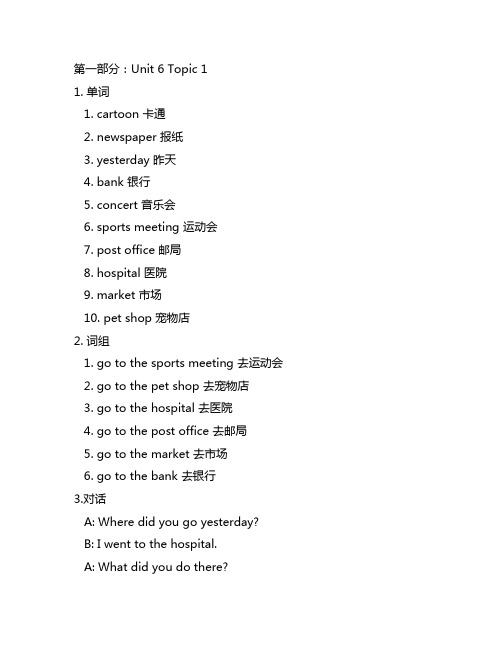
第一部分:Unit 6 Topic 11. 单词1. cartoon 卡通2. newspaper 报纸3. yesterday 昨天4. bank 银行5. concert 音乐会6. sports meeting 运动会7. post office 邮局8. hospital 医院9. market 市场10. pet shop 宠物店2. 词组1. go to the sports meeting 去运动会2. go to the pet shop 去宠物店3. go to the hospital 去医院4. go to the post office 去邮局5. go to the market 去市场6. go to the bank 去银行3.对话A: Where did you go yesterday?B: I went to the hospital.A: What did you do there?B: I visited my grandpa.A: Did you go to the bank after that? B: Yes, I did.第二部分:Unit 6 Topic 21. 单词1. dinner 晚餐2. breakfast 早餐3. lunch 午餐4. sandwich 三明治5. rice 饭6. noodles 面条7. spaghetti 意大利面8. bread 面包9. cake 蛋糕10. egg 鸡蛋2. 词组1. have dinner 吃晚餐2. have breakfast 吃早餐3. have lunch 吃午餐4. make a sandwich 做三明治5. cook rice 煮饭6. eat noodles 吃面条3.对话A: What did you have for breakfast?B: I had a sandwich and a glass of milk. A: What about lunch?B: I had some rice and vegetables.A: And for dinner?B: I had spaghetti and a piece of bread.第三部分:Unit 6 Topic 31. 单词1. read 读2. write 写3. draw 画4. sing 唱歌5. dance 跳舞6. play football 踢足球7. play basketball 打篮球8. play chess 下棋9. play the piano 弹钢琴10. play the guitar 弹吉他2. 词组1. read a book 读书2. write a letter 写信3. draw a picture 画画4. sing a song 唱歌5. dance to music 跟着音乐跳舞6. play football 踢足球7. play basketball 打篮球8. play chess 下棋9. play the piano 弹钢琴10. play the guitar 弹吉他3.对话A: What do you like doing in your free time?B: I like reading books and playing the piano.A: Do you also like singing and dancing?B: Yes, I do. I enjoy singing and dancing to music.第四部分:Unit 6 Topic 41. 单词1. Monday 星期一2. Tuesday 星期二3. Wednesday 星期三4. Thursday 星期四5. Friday 星期五6. Saturday 星期六7. Sunday 星期日2. 词组1. on Monday 在星期一2. on Tuesday 在星期二3. on Wednesday 在星期三4. on Thursday 在星期四5. on Friday 在星期五6. on Saturday 在星期六7. on Sunday 在星期日3.对话A: What day is it today?B: It's Thursday today.A: What day was it yesterday? B: It was Wednesday yesterday. A: What day will it be tomorrow? B: It'll be Friday tomorrow.第五部分:Unit 6 Topic 51. 单词1. spring 春天2. summer 夏天3. autumn 秋天4. winter 冬天5. season 季节6. warm 温暖的7. hot 炎热的8. cool 凉爽的9. cold 寒冷的10. weather 天气2. 词组1. in spring 在春天2. in summer 在夏天3. in autumn 在秋天4. in winter 在冬天5. the weather is warm 天气温暖6. the weather is hot 天气炎热7. the weather is cool 天气凉爽8. the weather is cold 天气寒冷3.对话A: What's your favorite season?B: My favorite season is summer.A: What's the weather like in summer?B: It's usually hot and sunny.结尾:以上是四年级上册译林版英语第六单元的重点笔记,希望对大家学习有所帮助。
小学四年级下册英语第六单元重点单词、短语、句型

举一反三:— Can I help you? 我能为您做点什么?
— Yes, I want a scarf.是的,我想要一条围巾。
2.Can I try them on? 我能试试吗?
★解读:“Can I do sth?” 是征求对方意见或建议的常用句型。try on是固定短语,意思是“试穿”。
(2)too用于肯定句句末,其前加逗号(口语中可省略逗号)时,意思是“也,还”。
I know the answer, too. 我也知道这个答案。
(3)too常与much连用构成短语too much,用来修饰不可数名词或单独使用,表示“太多”之意。
There is too much cloud in the sky. 天空中布满了云。
4.Don't knock them off the wall! 别把它们从墙上撞掉!
★解读:这是否定祈使句的句型,用来对他人表示建议பைடு நூலகம்命令和请求等。
5.It's pretty, isn't it? 它很漂亮,不是吗?
★解读:此句为反义疑问句,是疑问句的一种形式,句子结构由两部分构成。
四年级下册英语
第六单元重点单词、短语、句型
Unit 6 Shopping 购物
一、核心词汇
1.表示服饰及日用品的名词:
glove(分手指的)手套scarf围巾;披巾
umbrella伞;雨伞sunglasses太阳镜
2.描述商品的形容词:
pretty美观的;精致的expensive昂贵的;花钱多的
cheap花钱少的;便宜的nice好的
举一反三:— Can I try them on? 我能试试吗?
八年级上册英语第六单元单词
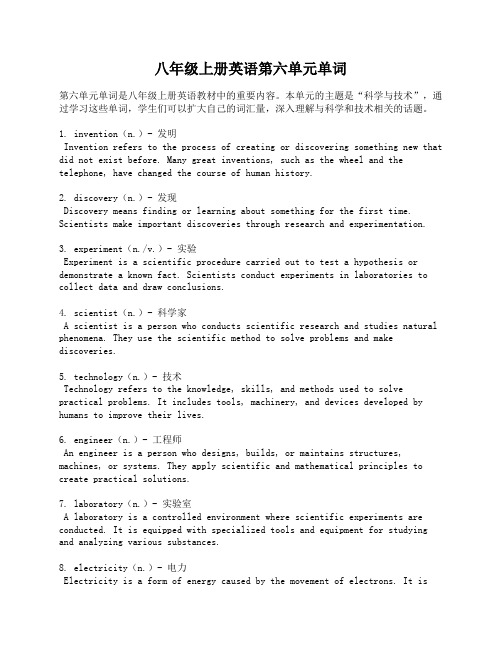
八年级上册英语第六单元单词第六单元单词是八年级上册英语教材中的重要内容。
本单元的主题是“科学与技术”,通过学习这些单词,学生们可以扩大自己的词汇量,深入理解与科学和技术相关的话题。
1. invention(n.)- 发明Invention refers to the process of creating or discovering something new that did not exist before. Many great inventions, such as the wheel and the telephone, have changed the course of human history.2. discovery(n.)- 发现Discovery means finding or learning about something for the first time. Scientists make important discoveries through research and experimentation.3. experiment(n./v.)- 实验Experiment is a scientific procedure carried out to test a hypothesis or demonstrate a known fact. Scientists conduct experiments in laboratories to collect data and draw conclusions.4. scientist(n.)- 科学家A scientist is a person who conducts scientific research and studies natural phenomena. They use the scientific method to solve problems and make discoveries.5. technology(n.)- 技术Technology refers to the knowledge, skills, and methods used to solve practical problems. It includes tools, machinery, and devices developed by humans to improve their lives.6. engineer(n.)- 工程师An engineer is a person who designs, builds, or maintains structures, machines, or systems. They apply scientific and mathematical principles to create practical solutions.7. laboratory(n.)- 实验室A laboratory is a controlled environment where scientific experiments are conducted. It is equipped with specialized tools and equipment for studying and analyzing various substances.8. electricity(n.)- 电力Electricity is a form of energy caused by the movement of electrons. It isused to power appliances, lighting, and various technologies.9. communication(n.)- 交流、通信Communication refers to the exchange of information or ideas between individuals. It can be done through verbal, written, or nonverbal means.10. robot(n.)- 机器人A robot is a mechanical device designed to perform tasks automatically. Robots are widely used in industries, space exploration, and other fields.11. computer(n.)- 计算机A computer is an electronic device that processes data and performs calculations. It is used for various purposes, including communication, research, and entertainment.12. internet(n.)- 互联网The internet is a global network of computers that allows users to access and share information. It has revolutionized communication and transformed various aspects of daily life.13. software(n.)- 软件Software refers to the programs and instructions that control a computer's operations. It includes applications, operating systems, and other digital tools.14. hardware(n.)- 硬件Hardware refers to the physical components of a computer system, such as the monitor, keyboard, and central processing unit (CPU).15. experiment(n./v.)- 实验Experiment is a scientific procedure carried out to test a hypothesis or demonstrate a known fact. Scientists conduct experiments in laboratories to collect data and draw conclusions.16. energy(n.)- 能源Energy is the capacity to do work or produce heat. It exists in various forms, including thermal, electrical, and mechanical energy.17. microscope(n.)- 显微镜A microscope is an optical instrument used to magnify small objects or minute details. It is widely used in scientific research and medical diagnostics.18. telescope(n.)- 望远镜A telescope is an optical device used to observe distant objects in space. It enables astronomers to study celestial bodies and phenomena.19. satellite(n.)- 卫星A satellite is an object in space that orbits around a planet or another celestial body. Satellites are used for communication, weather forecasting, and navigation.20. nuclear(adj.)- 核能的Nuclear refers to the energy released through nuclear reactions, such as atomic bombs and nuclear power plants. It is a powerful but potentially dangerous source of energy.以上是八年级上册英语第六单元的单词介绍。
8年级上册英语第6单元
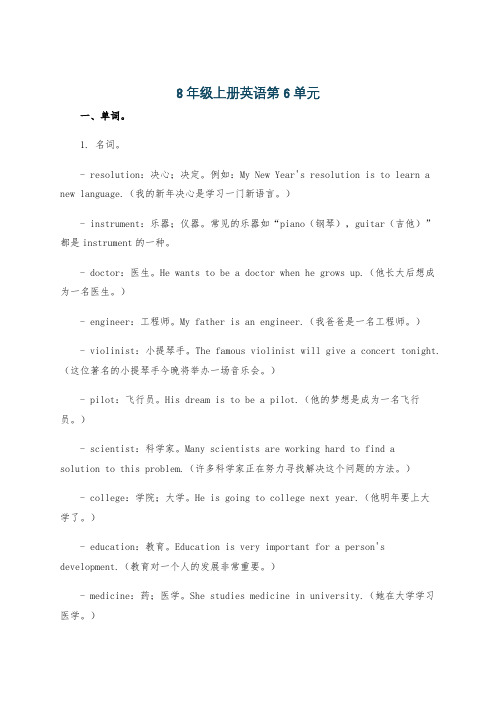
8年级上册英语第6单元一、单词。
1. 名词。
- resolution:决心;决定。
例如:My New Year's resolution is to learn a new language.(我的新年决心是学习一门新语言。
)- instrument:乐器;仪器。
常见的乐器如“piano(钢琴),guitar(吉他)”都是instrument的一种。
- doctor:医生。
He wants to be a doctor when he grows up.(他长大后想成为一名医生。
)- engineer:工程师。
My father is an engineer.(我爸爸是一名工程师。
)- violinist:小提琴手。
The famous violinist will give a concert tonight.(这位著名的小提琴手今晚将举办一场音乐会。
)- pilot:飞行员。
His dream is to be a pilot.(他的梦想是成为一名飞行员。
)- scientist:科学家。
Many scientists are working hard to find asolution to this problem.(许多科学家正在努力寻找解决这个问题的方法。
)- college:学院;大学。
He is going to college next year.(他明年要上大学了。
)- education:教育。
Education is very important for a person's development.(教育对一个人的发展非常重要。
)- medicine:药;医学。
She studies medicine in university.(她在大学学习医学。
)- article:文章;论文。
I wrote an article for the school magazine.(我为校刊写了一篇文章。
八年级上册英语第6单元单词
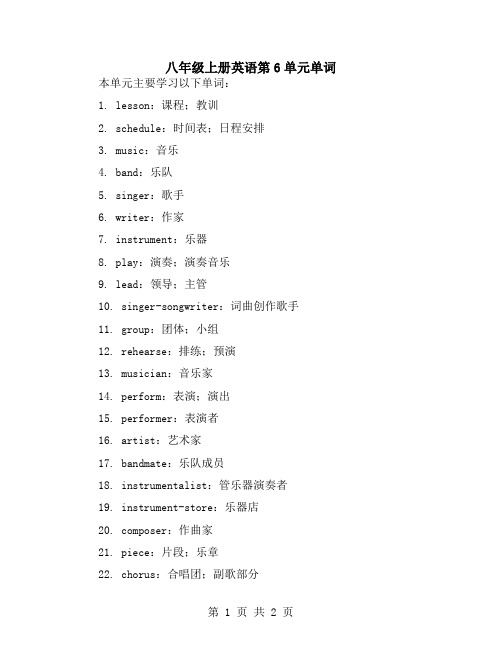
八年级上册英语第6单元单词本单元主要学习以下单词:1. lesson:课程;教训2. schedule:时间表;日程安排3. music:音乐4. band:乐队5. singer:歌手6. writer:作家7. instrument:乐器8. play:演奏;演奏音乐9. lead:领导;主管10. singer-songwriter:词曲创作歌手11. group:团体;小组12. rehearse:排练;预演13. musician:音乐家14. perform:表演;演出15. performer:表演者16. artist:艺术家17. bandmate:乐队成员18. instrumentalist:管乐器演奏者19. instrument-store:乐器店20. composer:作曲家21. piece:片段;乐章22. chorus:合唱团;副歌部分用法举例:1. 我们下周有一节音乐课(lesson),希望大家都能按时到达(schedule)。
2. 她是一位出色的音乐家,擅长演奏各种乐器(musical instruments)。
她经常去乐器店(instrument-store)购买新的乐器。
3. 乐队成员们正在紧张地排练(rehearse)新歌,准备在音乐节上演出(perform)。
4. 这位词曲创作歌手(singer-songwriter)的作品深受人们的喜爱,他的音乐风格独特,富有艺术性(artistically)。
5. 如果你想学习一种乐器,可以去乐器店咨询一下(consult the instrument store),那里有专业的老师可以指导你。
6. 这首乐曲是由一位著名的作曲家创作的(composed),它包含了各种乐器的演奏片段(pieces),是一首非常动听的音乐作品。
7. 他们在音乐会上合唱了一首动人的歌曲,赢得了观众的热烈掌声(applause)。
8. 这位歌手不仅是一位出色的歌手,还是一位优秀的演员(performer),她的表演总是那么精彩。
英语八年级下册第6单元笔记
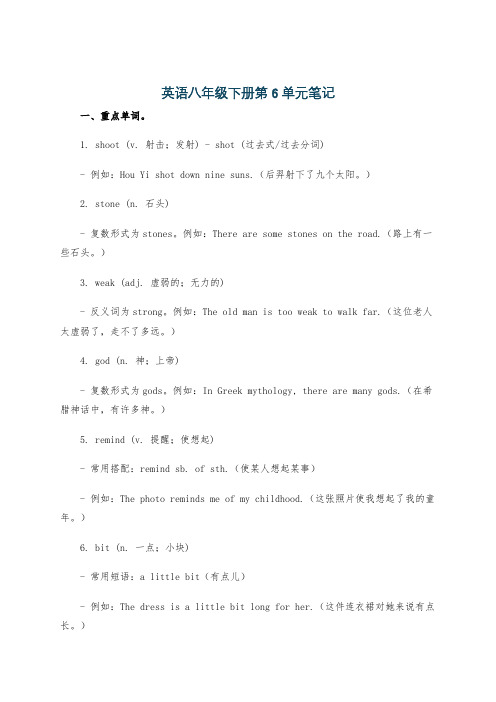
英语八年级下册第6单元笔记一、重点单词。
1. shoot (v. 射击;发射) - shot (过去式/过去分词)- 例如:Hou Yi shot down nine suns.(后羿射下了九个太阳。
)2. stone (n. 石头)- 复数形式为stones。
例如:There are some stones on the road.(路上有一些石头。
)3. weak (adj. 虚弱的;无力的)- 反义词为strong。
例如:The old man is too weak to walk far.(这位老人太虚弱了,走不了多远。
)4. god (n. 神;上帝)- 复数形式为gods。
例如:In Greek mythology, there are many gods.(在希腊神话中,有许多神。
)5. remind (v. 提醒;使想起)- 常用搭配:remind sb. of sth.(使某人想起某事)- 例如:The photo reminds me of my childhood.(这张照片使我想起了我的童年。
)6. bit (n. 一点;小块)- 常用短语:a little bit(有点儿)- 例如:The dress is a little bit long for her.(这件连衣裙对她来说有点长。
)7. silly (adj. 愚蠢的;不明事理的)- 例如:It's silly of you to do such a thing.(你做这样的事很愚蠢。
)8. object (n. 物体;物品)- 例如:There are many strange objects in the museum.(博物馆里有许多奇怪的物品。
)二、重点短语。
1. once upon a time.- 意为“从前”,常用于故事的开头。
例如:Once upon a time, there was a beautiful princess.(从前,有一位美丽的公主。
九年级上册英语第六单元单词

九年级上册英语第六单元单词一、重点单词。
1. prefer [prɪˈfɜː(r)] vt. 更喜欢。
2. lyrics [ˈlɪrɪks] n. (pl.) 歌词。
3. Australian [ɔːˈstreɪliən] adj. 澳大利亚(人)的;n. 澳大利亚人。
4. electronic [ɪˌlekˈtrɒnɪk] adj. 电子的;电子设备的。
5. suppose [səˈpəʊz] v. 推断;料想。
6. smooth [smuːð] adj. 平滑的;悦耳的。
7. spare [speə(r)] adj. 空闲的;不用的;v. 抽出;留出。
8. director [dəˈrektə(r)] n. 导演;部门负责人。
9. case [keɪs] n. 情况;实情。
10. war [wɔː(r)] n. 战争;战争状态。
11. stick [stɪk] v. (stuck, stuck) 粘贴;将……刺入。
12. down [daʊn] adj. 悲哀;沮丧。
13. dialog [ˈdaɪəlɒɡ] n. (=dialogue) 对话;对白。
14. ending [ˈendɪŋ] n. (故事、电影等的)结局;结尾。
15. documentary [ˌdɒkjuˈmentri] n. 纪录片。
16. drama [ˈdrɑːmə] n. 戏;剧。
17. plenty [ˈplenti] pron. 大量;众多。
18. shut [ʃʌt] v. (shut, shut) 关闭;关上。
19. superhero [ˈsuːpəhɪərəʊ] n. 超级英雄。
20. once in a while偶尔地;间或。
二、短语中的单词。
1. dance to随着……跳舞。
2. sing along with随着……一起唱。
3. different kinds of不同种类的。
4. depend on视……而定;依靠;依赖。
- 1、下载文档前请自行甄别文档内容的完整性,平台不提供额外的编辑、内容补充、找答案等附加服务。
- 2、"仅部分预览"的文档,不可在线预览部分如存在完整性等问题,可反馈申请退款(可完整预览的文档不适用该条件!)。
- 3、如文档侵犯您的权益,请联系客服反馈,我们会尽快为您处理(人工客服工作时间:9:00-18:30)。
abstract adj.抽象的,深奥的religious adj.信奉宗教的,虔诚的wavy adj.波状的,摇摆的religion n.宗教, 信仰imagination n.想象purpose n.目的,意图imagine v.想象;设想pattern n.式样;模式imaginative adj.富有想象力的character n.特性,特征 ,字符,人物imaginary adj.假象的,虚构的happiness n.幸福;快乐
painter n.画家;油漆匠temple n.庙宇;寺庙
paint v.油漆, 画, 描绘,offering n.提供;奉献物;祭品pain n.痛苦relate... to…把...与...联系起来painful adj.痛苦的jewellry n.珠宝
exhibition n.展览会try out试用;试验
exhibit v.展览rent n.租金
poetry n.诗歌(总称)pipe n.管子
poet n.诗人mercy n.慈悲;怜悯;同情心poem n.诗washroom n.盥洗室
shade n.阴凉处damp adj.潮湿的
shady adj.成荫的, 阴暗的basement n.地下室
sweat n.汗bathe v.洗澡;沐浴
youth n.青春;年轻人fence n.栅栏;围墙
fix one's eyes on注视;凝视narrow adj.狭窄的
creature n.动物;生物;人hold one's breath屏住呼吸
artist n.画家;艺术家hold up举起
valuable adj.贵重的;有价值的garage n.车库;修理厂typical adj.典型的;象征性的garbage n.垃圾;废物emphasis n.强调apartment n.公寓;住宅emphasize v.强调, 着重subway n.地铁
elegantly adv.优美的,优致的downtown adv.在市区;市区的elegant adj.优美的,优致的curtain n.窗帘
elegancy n.优美, 优雅ari conditioner空调
detail n.细节,详情conclusion n.结束;结论detailed adj.细节的,逐条的conclude v.结束, 作出结论,推断cloth n.布;布料modern Chinese folk art中国现代民间艺术shallow adj.浅的during one's life time在…的有生之年
shore n.岸边develop the tradition of
…使…传统发扬光大
eyesight n.视力combine…with…把…结合在一起feature n.特征;特色hold exhbitions举办展览
roof n.房顶promote Chinese art宣扬中国美术statue n.雕像racing horse奔马
angel n.天使at high speed以高速
architect n.建筑师at the speed of…以…速度
ruin vt.n.毁灭;废墟;遗迹in a creative way创造性地;用创造性
的方法
fairytale n.童话be a favorite of…是…的至爱,最爱situate v.使位于;使处于during one's early youth在…年轻时situation n.位置,情形, 境遇change to…转变到…;改变成…fairytale n.童话everyday life日常生活
sort of有几分地,有点…leave…doing…使…做
date back to;date from追溯到…use one's imagination运用…想象力
第二模块第 6 单元词汇与短语
be a typical example of是…的经典杰作be deep in thought沉思
be positioned at/in/over 放在…处/里/上
paint …black把…画/涂成黑色
be in ruins…在废墟中
be located on/in/at…坐落在…上/里/处from an early age从小;从小时候bring good luck带来好运
double happiness双喜
be often found in/on…常见于…
on special days在重大/特殊场合
be ready to do…乐意做…
cross out…划掉…
leave …out舍去…;省略;排除by the time…在/到…时候
share …with…与…分享/分担
pay rent to…付租金给…
have (no) mercy on…对…有/无同情心move to/into…搬迁到/进…
on the other side of…在…的另一边/面one day总有一天;有朝一日running water自来水
dream of…梦想…
dream up构思, 创造, 设计
be adapted from…节选自…
World Heritage Site世界遗产UNESCO联合国教科文组织more than any other…比任何其他…都多memorial to……的纪念馆
be surrounded by…被…包围/环绕scenic and historic
interest area
风景名胜区
be home to…是…的家园endangered animals濒危动物
It's one's turn to do…轮到…做…了
be determined to do…决心做…;决定做…famous landmark著名地标。
